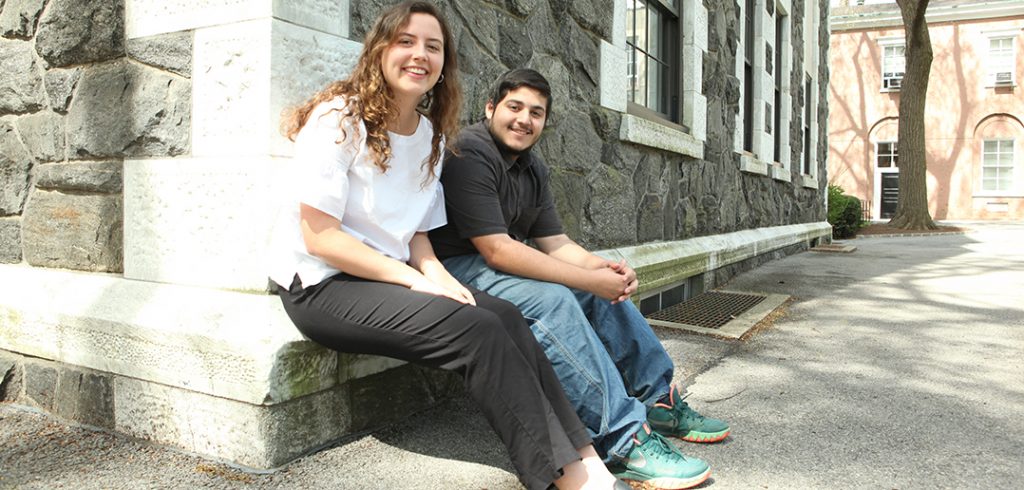This year, Fordham is in the top 25 for medium-sized colleges sending the most volunteers to the Peace Corps. Seventeen graduates are planning to begin their service with the organization in just a few months. And, as always, the University continues to send talented alumni to the Jesuit Volunteer Corps—six this year from the class of 2019.
“Fordham students have a passion for leadership and understand the academic underpinnings of societal issues. That passion gets ignited in the classroom and continues with civic engagement in the Bronx, Manhattan, and beyond,” said Arto Woodley, Ed.D., executive director of the Center for Community Engaged Learning. “As [Irish poet William Butler] Yeats said, ‘Education is not the filling of a pail, but a lighting of a fire.’”
All volunteers bring individual expertise to their respective organizations, but Fordham College at Rose Hill seniors Marc De La Hoz and Laura Lynch said Fordham students bring something extra: a commitment to service, honed over their four years here.
De La Hoz is heading to Cameroon with the Peace Corps as a health educator. Lynch will assist teachers at underserved community schools outside of Sacramento, California, with the JVC, one of the world’s largest lay, Catholic, full-time volunteer programs. Both say they are going away to learn, as well as to help.
Lynch said her experiences in Alaska and Mississippi with Fordham’s Global Outreach, part of the Center for Community Engaged Learning, taught her a lot about how to approach helping others. At the forefront is self-awareness of her own privilege.
“When you’re working with marginalized communities, or any kind of service work, you have to be careful not to be paternalistic,” said Lynch, adding that the people she’ll be aiming to help will have plenty to teach her.
The French major said she’ll be brushing up on her Spanish over the summer before beginning her one-year stint as a teacher’s assistant at Saint Hope Charter Schools in Sacramento, a city known more for its wealth than its underserved communities.
“Everyone talks about how nice a city it is, but there’s shocking disparity, so historically underserved populations don’t benefit from that reputation,” she said, adding that it’s not unlike her experiences volunteering in the Bronx, where impoverished communities sit amidst New York’s enormous wealth.
Lynch has some experience in teaching; while at Fordham, she volunteered as a tutor at Concourse House, a transitional housing site, and at the Rose Hill Tutoring Center.
She said she’s looking forward to the JVC version of volunteering, which incorporates Ignatian values signified by four pillars: simple living, social justice, community, and spirituality. To that end, she’ll be living in a community with other JVC volunteers on a small stipend, where she’ll share dinners and experiences. Mostly, she’s looking forward to meeting her new students.
“I want to stand with these students and hear about their experience,” she said. “This is for me as much a learning experience as another year of school would be.”
De La Hoz also expressed a desire to learn from the people of Cameroon over the next two years. He’s already hunkered down on reading about the diverse country, which tends to “lean very religious and conservative,” he said, regardless of the many religions represented there. He said he’s expecting to embark on a period of listening to understand what’s needed from him. He spent years teaching sexual health as a volunteer at Peer Health Exchange in New York City, a health education program for underserved community youth. He used what he learned at Peer Health to help educate a diverse group of populations about sexual health, from sex workers in the Dominican Republic to teens at his church near his hometown of Fishkill, New York.
Each community has its own needs and each has its own way of receiving health information, he said. Bronx teens appreciate frankness, he said, “or they immediately lose interest.”
“With a sex worker, the situation is very different. In that case, it’s sitting there and letting them know you are listening to them as a person, not a sex object,” he said.
In Cameroon, he’ll need to learn the needs of a new population: those living with HIV/AIDS. He will not be dealing with clients as directly as in the past. The Peace Corps, established in 1961 by President John F. Kennedy with Sargent Shriver serving as its first director, has its members work side by side with local leaders to tackle challenges.
He said his experience working with immigrants in his own community laid bare what happens when people don’t get the health information they need.
“Health education is what decides success in life,” he said. “If you’re a 14-year-old girl without real health education, you could get pregnant. A baby is a blessing, but what about that young girl’s future?”
De La Hoz’s ultimate goal will be medical school when he returns from Cameroon. For now, he’s set to listen.
“I won’t know the best way to get things done until I get there.”

